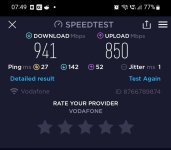You are using an out of date browser. It may not display this or other websites correctly.
You should upgrade or use an alternative browser.
You should upgrade or use an alternative browser.
AX 160mhz vs 80mhz (battery usage)
- Thread starter leerees
- Start date
Tech Junky
Part of the Furniture
I run 160 and I prefer speed over battery since the phone battery is 5000mah it lasts quite awhile anyway.
Phone doesn't have a dual antenna anyway and connects at 1200 but the laptop connects at 2400 and gets real world speed of 1.5gbps.
Phone doesn't have a dual antenna anyway and connects at 1200 but the laptop connects at 2400 and gets real world speed of 1.5gbps.
I run 160 and I prefer speed over battery since the phone battery is 5000mah it lasts quite awhile anyway.
Phone doesn't have a dual antenna anyway and connects at 1200 but the laptop connects at 2400 and gets real world speed of 1.5gbps.
When on 160mhz, the newer devices get around 950mb/s (1gbps WAN). With 80mhz, it's only 400mb/s.
I can't actually notice any difference in perceived speed (Samsung galaxy s22 ultra and various iphones). Browsing is just as snappy. Netflix UHD starts streaming instantaneously with 400mb/s and scrolling to a different part of a YouTube 8K video is also instant.
Anything I can do to improve battery life on our devices is important. I already have TWT, OFDMA and MUMIMO enabled.
Tech Junky
Part of the Furniture
Well, if that extra 2% of battery per day is more important then drop to 80mhz or 40mhz. I move data on the LAN and dropped my Cable 1gbps connection for FWA instead for 1/2 the price and 2-3X the upload speeds.
Tech9
Part of the Furniture
I recently switched down to 80mhz channels and have noticed an increase in battery life on my phone.
Signal to noise ratio @80MHz is better. It translates to better range. Your phone needs less transmit power to maintain the connection. Modern mobile devices have sophisticated power management and that includes dynamic radio transmit power adjustment. Your observations are correct.
Hoping to expand a little more on this.
My specific router (RTAX92u) has the following options on the AX band
4x4:4 (160mhz) vs 2x2:2 (80mhz).
How much more power would 4 streams use compared to 2 streams?
Would this extra power usage be mitigated by the fact data is transfered faster?
My specific router (RTAX92u) has the following options on the AX band
4x4:4 (160mhz) vs 2x2:2 (80mhz).
How much more power would 4 streams use compared to 2 streams?
Would this extra power usage be mitigated by the fact data is transfered faster?
Tech Junky
Part of the Furniture
It's not going to be significant in terms of the power bill if you're asking that.
If you want to go fast then 4x4 is your option. If you are fine with slower speeds then leave it alone.
If you want to go fast then 4x4 is your option. If you are fine with slower speeds then leave it alone.
Tech9
Part of the Furniture
4x4:4 (160mhz) vs 2x2:2 (80mhz)
No, your RT-AX92U AX radio is BCM43684 - 4x4:4 on both 80MHz and 160MHz wide channel.
It's not going to be significant in terms of the power bill if you're asking that.
No. I'm talking about saving battery life on the mobile devices so they last longer between charges.
I was wondering if having more streams caused a noticable drain?
Tech Junky
Part of the Furniture
Turn on 160mhz, charge your phone to 100% and use like normal. Go into the battery setting when it gets down to 10% and note the time. Recharge and repeat and compare.I was wondering if having more streams caused a noticable drain?
For my use on a 5000mah battery I easily get over a day on WiFi only.
Similar threads
- Replies
- 5
- Views
- 5K
- Replies
- 4
- Views
- 269
- Replies
- 13
- Views
- 1K
Similar threads
Similar threads
-
Asus GT-AX11000 5Ghz-2 160Mhz not working
- Started by ZerOneX
- Replies: 11
-
RT-AX88U Intel AX211 Speeds / Cannot set 160Mhz Channel
- Started by elfarto
- Replies: 4
-
-
Asus XT8 - Wireless Backhaul - Capping at 350Mbps on 160MHz/5GHz
- Started by jamesfromage123
- Replies: 20
-
Battery drain on my Pixel 6 only when connected to RT-AX55 router
- Started by brunoschcabnc
- Replies: 3
Latest threads
-
Bug found in Brazil --> Parental Control x Amazon Prime|Disney+
- Started by esas
- Replies: 0
-
Has my ZenWifi XD5 (AX3000) router been compromised?
- Started by rippan
- Replies: 2
-
Set up Instant Guard on my RT-Ax86U Pro with private ip
- Started by jerrywyh
- Replies: 2
-
-
Prevent client from connecting to router but allow connection to internet via access point
- Started by swbrains
- Replies: 4
Sign Up For SNBForums Daily Digest
Get an update of what's new every day delivered to your mailbox. Sign up here!


